NYC's Mercantile Mayhem: Buunni's New Coffee Roaster in The Bronx, Transplant Evy Chen, Maine's Indy Biz & Mo' Momo in Queens
A newsletter about the survival of independent businesses in New York City with a focus on immigrant-owned, storefront retail and CPG enterprises.
A COFFEE ROASTER OPENS IN THE BRONX
The aroma of fresh roasted coffee beans now wafts down Barretto Street in Hunts Point, The Bronx. The Roasting Room by Buunni is a new coffee bean roasting facility launched by Sarina Prabasi and Elias Gurmu, who own and operate four Buunni Coffee cafes in upper Manhattan. While The Roasting Room has been in operation for several months, the official ribbon cutting takes place on September 12, 2024 at 11am.
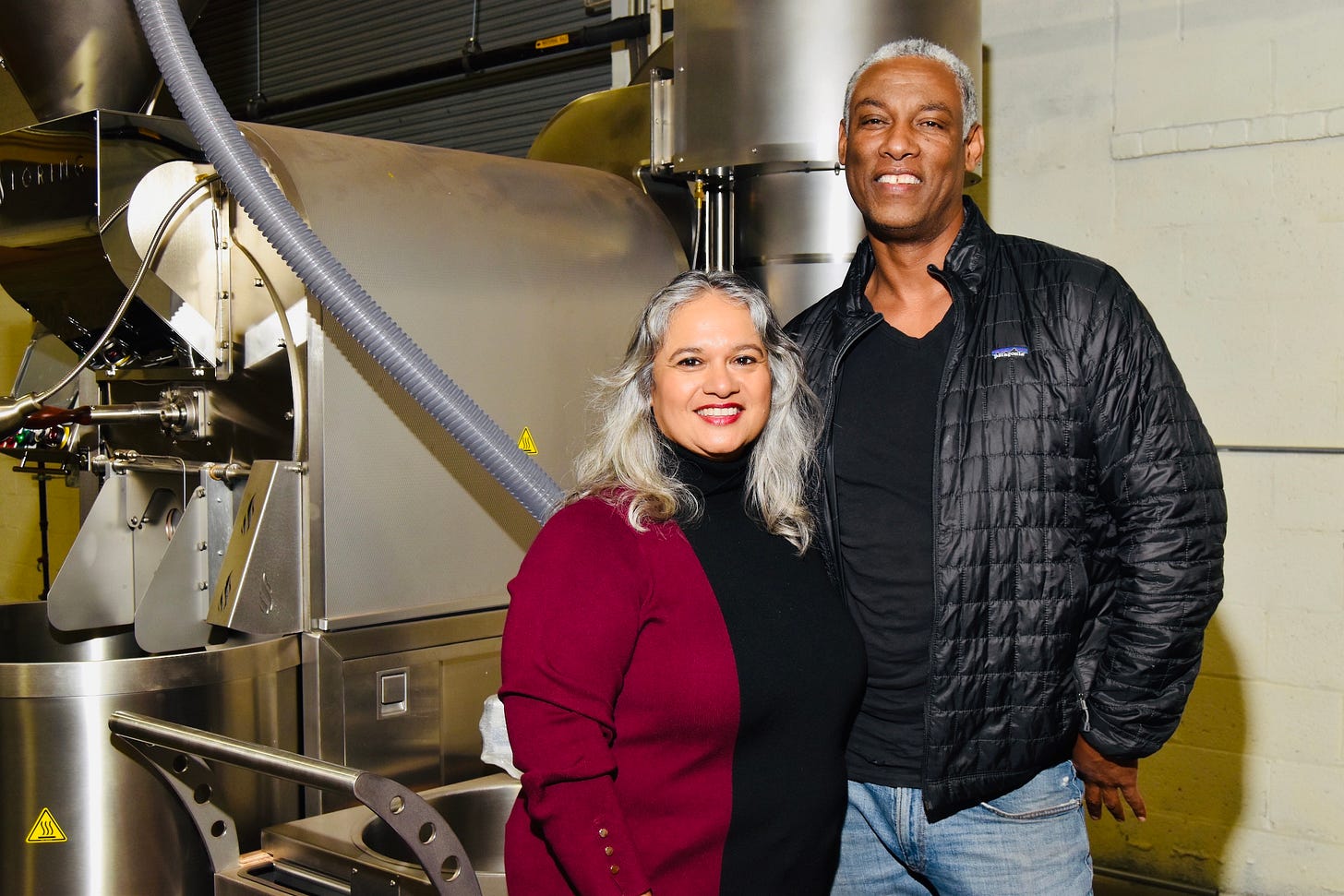
Buunni’s cafes in Washington Heights and Inwood specialize in Ethiopian beans, with a smattering of Dominican and other Latin American beans in the mix. The first Buunni Cafe opened in 2012, I wrote about its early days for the Guardian, it quickly became popular for its superb coffee, especially the magnificent Ethiopian Macchiato (better than the Italian, sorry Italy) and a place for neighbors to convene and catch up. Buunni sells their roasted beans via ecommerce and retail, from Trader Joe’s to The Metropolitan Museum of Art.
Prabasi and Gurmu (side note: they met and fell in love many moons ago in Addis Ababa, Ethiopia, Gurmu’s hometown) opened The Roasting Room to not only roast their own beans but also other coffee business’s beans. It’s officially a co-roasting facility so coffee businesses of all sizes can physically roast their own beans or have them roasted by The Roasting Room, called “toll-roasting” in coffee roast lingo. Prabasi and Gurmu also offer roasting options for private label businesses.
If you are interested in coffee, roasting, independent businesses or The Bronx and want to attend The Roasting Room’s ribbon cutting on September 12 at 11am, email: hello@roastingroom.coffee for more information.
ASK A VISITOR TRANSPLANT
A couple newsletters back I introduced the “Ask a Visitor” Q&A series, a look at the state of the city’s economic ecosystems through fresh eyes, from mercantile street life to the more obscure world of capital. I interviewed Amir Amirani first, this week’s Q&A is morphing into “Ask a Transplant” with Evy Chen, as she moved to New York City in early July. Chen, originally from China, is an entrepreneur who founded Evy Tea, which she operated for 12 years in Boston, MA. Evy Tea was a ready to drink cold brew tea with several cafes and food services division. Last summer Chen made a huge change. She closed Evy Tea and began the prestigious MIT Sloane Fellows program at the MIT Sloane School of Management. Chen currently works within the world of capital, as a consumer behavior/customer insight consultant and researcher, now in New York City.
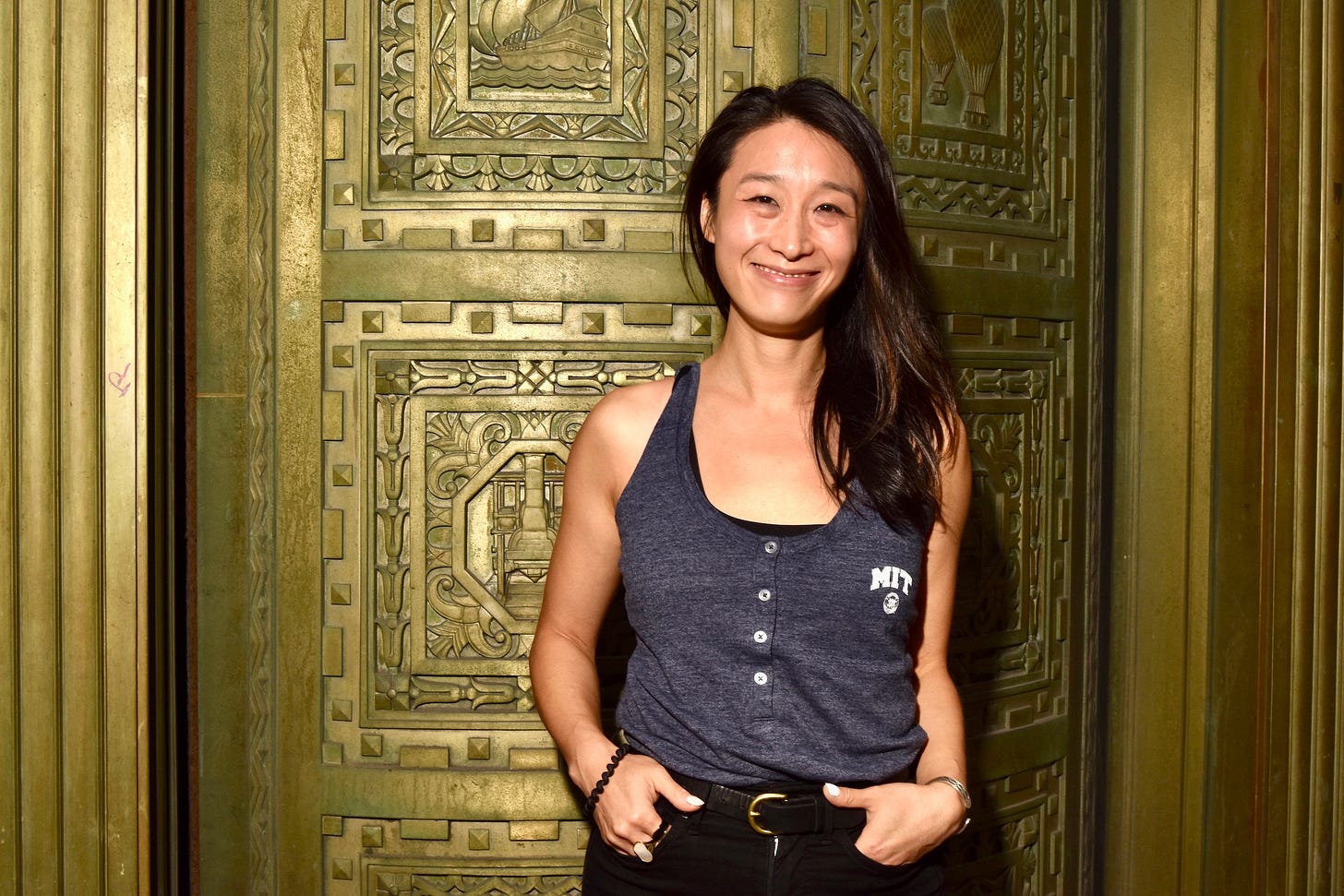
I initially met Chen in 2017 when covering the Fancy Food Show, I wrote a story about Chen and several other immigrant entrepreneurs at the show. We’ve kept in touch ever since.
Nina Roberts: You moved here in early July. How does New York City compare to Boston?
Evy Chen: I think New York City is an easier place to survive than Boston. There are a lot of resources here, I’ve found it extraordinarily welcoming. I’ve had many interesting, easy, helpful conversations with strangers.
I’m living in Little Haiti [Brooklyn] right now. When I first moved into the neighborhood, I walked past a restaurant and saw an Asian looking couple. I thought they might be where I'm from, Fujian. They were, so I started asking them questions about the neighborhood in Chinese—I don't know them, I have no relationship with them—yet within three minutes, I walked out from that restaurant feeling so assured. I would have had no way of accessing that kind of information by purely doing searches on the internet.
NR: So, you ran your own ice tea company for 12 years, you no longer do. Are you done with the CPG (consumer packaged goods) world?
EC: When you're in CPG, everything's business, everything's work. You go to a supermarket, you don't look at what's in season, you flip over packages to look at the nutrition label. For ten years, everywhere I looked—I know this person who runs this brand, I know that person who runs that brand.
I don't have that burden anymore, so when I see brands and products now, the curiosity has come back. And I'm talking to quite a few corporate venture funds that are within the CPG world, so I’m still in it.
NR: Maybe a broader view?
EC: At MIT I learned to look at marketing and economics differently. When you're a CPG person, your eyes are on the marketing end—the packaging, the brand, the logo, everything sensory. Now I'm looking at the economics, meaning, all those brands are little dots within this long linear development because we're in the middle of transition. AI is changing everything. Where are we going to go in the next 10 to 15 years? Nobody knows. Nobody even knows where we're going to be in the next two to three years.
As an industry, food and beverage is a huge part of our economy—I mean, without spending money on food and beverage, we're all going to die.
NR: True!
EC: I want to contribute towards a larger change in the system, less so on a small brand. Tracking how consumer habits have changed is more interesting to me now.
NR: Have any businesses you’ve come across in New York City caught your attention?
EC: The Listing Project is interesting because the business model, in theory, shouldn’t work. They are a membership, it’s $6.99 a month. Word of mouth is taking that thing around.
NR: I think the founder [Stephanie Diamond] considers it her art practice.
EC: That economy happening today, here and now, is interesting. You are saying that the mindset of us belonging to the same community—creative people, academic people, people who write—outweighs your value in dollars, hence, there is a dollar value in trusting. Therefore, that’s how that market works—that’s fascinating to me.
This Q&A had been edited and condensed for clarity.
INDEPENDENT BUSINESSES: A BRIEF MID-COAST MAINE EDITION
This newsletter focuses on New York City, but I came across several Maine enterprises earlier this month with creative approaches. Walking around Maine’s cities and towns there seemed to be a higher ratio of independent businesses to chain stores compared to New York City.
I would like to think these businesses are able to survive because it’s cheaper than New York City, but the cost of living is quite high in Maine, especially along the coast. According to Mainebiz, 99.2% of the businesses in Maine are considered small businesses (using SBA’s definition) and estimates there to be 151,212 small businesses.
At the Rockland Farmers’ Market I encountered the mobile unit on wheels of Little Chair Printing, based in Portland. Owner Hope Rovelto had two working screens and was printing bags and t-shirts on the spot for customers. Rovelto even gave away small Kamala Harris for President prints (yes, I got one). Most of Little Chair Printing’s corporate customers are local small businesses and the mobile unit can be hired for parties and events.
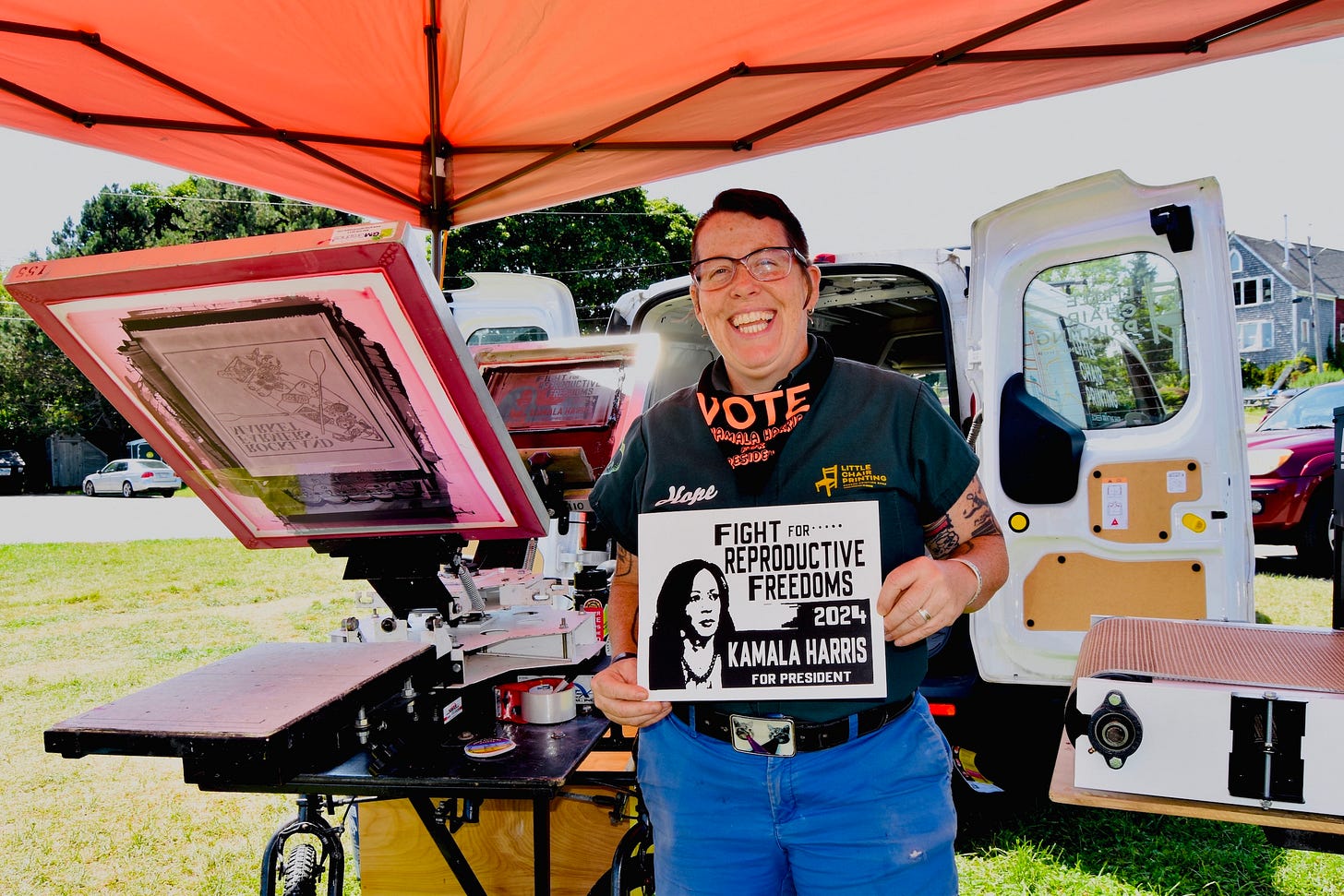
Another creative business model is Union Street Sourdough in Camden. Owner Bridget Mariner is known for her long fermented sourdough breads, bagels, scones, cookies and granola among other treats. Maine is one of the states that allows people to bake and sell out of their homes, as long as kitchens meet regulations to obtain the proper permit.
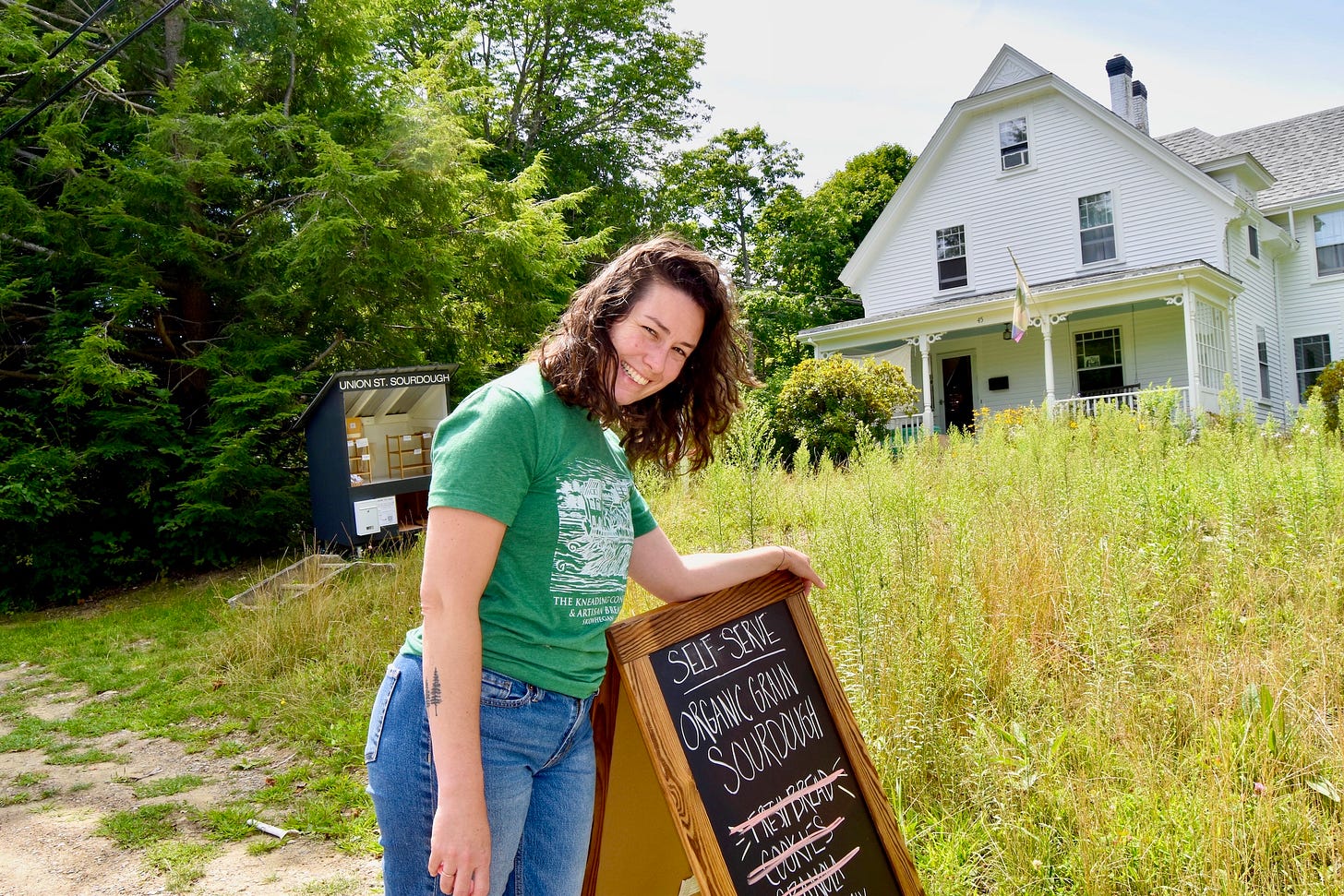
Union Street Sourdough customers place orders online and then pick-up their baked goods in the front yard rack, she offers a few extra items for sale. As you can see, the rack is empty, Mariner sells out quickly. (We thought we could swing by and just pick up a loaf, wrong, this is not Hannaford’s!)
There are so many other small businesses in Maine I’ve met in the past that I couldn’t get to on this trip: Bizibuns, Maíz, Dina’s, Rwanda Bean, Maine Coast Rope Rugs, among others.
A REMINDER: MOMO CRAWL IS AROUND THE CORNER
This year’s Momo Crawl is on September 15, 2024. Thirty or so momo establishments around Diversity Plaza in Jackson Heights, Queens, will be selling their best momo, from carts, food trucks and restaurants. Momo Crawl participants eat and later vote for the best momo establishment. The winning momo business gets a heavy-weight style champion belt with a golden momo affixed to the front. Momo are succulent dumplings that originate in Tibet and have spread through the diaspora to lands beyond, including Queens.
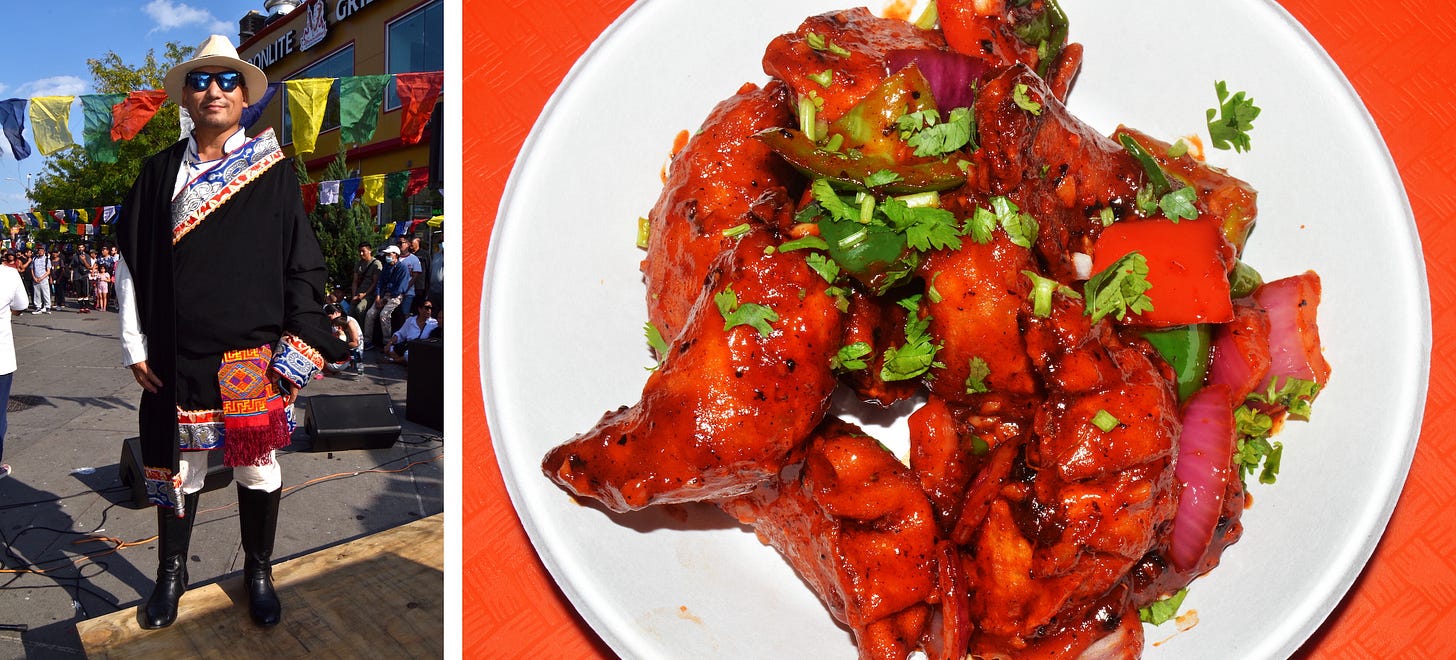
The Momo Crawl is fun, slightly chaotic—participants purchase a passport that allows for $1 momo—with music, dancing and other performances, full of gorgeous outfits like the gentleman above.
A quick note: these momo establishments are nearly always open for business, so you can get the lay of the land before the actual Momo Crawl if need be. For more information, follow the Momo Crawl’s Instagram. One of the sponsors is the wonderful Accompany Capital; all Momo Crawl proceeds go to Students for a Free Tibet.
MERCANTILE MAYHEM NEWSLETTER SPONSORSHIP
Will the city become full of Sweetgreens, Chipotles and bank ATM locations? If you care about independent businesses, I am still looking for two (maybe just one, keeping fingers and toes crossed) additional sponsors—individuals, businesses, organizations or foundations—who believe in the survival of independent businesses. Sponsors, like the extraordinary Accompany Capital have a footer that is viewed by all sorts of brilliant people on the mailing list. If you would like to know sponsorship rates and newsletter stats (open rates and such) please email me: ninarobertsnyc@gmail.com and I’ll send you the details. Please forward this newsletter to others.
A million thanks to Mercantile Mayhem’s sponsor Accompany Capital, helping immigrants and refugees with loans and financial services. Read about Accompany Capital here.
OPPORTUNITIES
Applications are open for the prestigious Paul and Daisy Soros Fellowships for New Americans that pays for one to two years of graduate study. It’s open to immigrants or children of immigrants. Deadline: October 31, 2024.
Immigrant founders, find your people and network through the Unshackled Ventures community. Unshackled Ventures is VC fund based out of the Bay Area cofounded by Manan Mehta and Nitin Pachisia, apply here.






I LOVE your newsletter so much! (Why oh why, have I stayed away so long?) It's very satisfying to read something that's truly newsy, and always inspiring. You make me want to get out of my apartment and find new things, which is pretty much the whole point of living in NY. Thank you, Nina!
Thank you so much Debra! The city offers us many opportunities, which I sometimes forget until I leave the house!